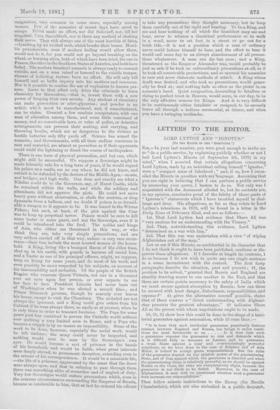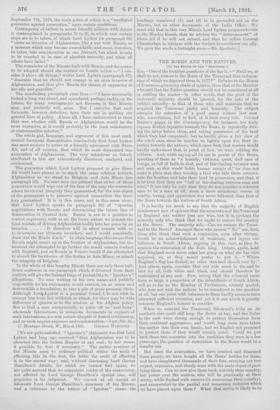LETTERS TO THE EDITOR.
LORD LYTTON AND " IGNOTITS."
[TO THE EDITOR OF THE SPECTATOR."]
Slit,—In your last number, you were good enough to invite me to " do a public service, by explaining publicly whether or not I bad Lord. Lyttou'e Minute (of September 4th, 1878) in my mind," when I asserted that certain allegations concerning Lord Lytton, made by an individual calling himself " Ignotus," were a " compact mass of falsehood ; " and, if so, how I recon-
ciled the Minute in question with.my language. Assuming that you are right iu believing that I can perform a public service by answering your query, I hasten to do so. Not only was I acquainted with the document alluded to, but its contents are, in my opinion, conclusive proof of the falsity of those parts of " Ignotus's " statements which I have troubled myself to chal- lenge and deny. His allegations, so far as they relate to Lord Lytton's intentions in 1878, will be found in a letter in the Daily News of February 22nd, and are as follows :— 1st, That Lord Lytton had evidence that Shore Ali was " very anxious for an understanding with the Viceroy."
2nd. That, notwithstanding this evidence, Lord Lytton "determined on a war with him."
3rd. That this war was undertaken with a view " of wiping Afghanistan out of the map."
Let us see if this Minute, so confidential in its character that I do not thiuk it ought to have been published, confirms or dis- proves these allegations. If I describe at length its contents, I do so because I do not wish to quote any one single sentence in a sense inconsistent with the context. The first forty paragraphs describe the situation, past and present ; 41, the problem to be solved, "granted that Russia and England are steadily drawing nearer to one another in the East, and that there are certain points necessary to the safety of India which we must secure against absorption by Russia; how can these be secured with least danger, disturbance, responsibilities, and expense ?" 44 gives the alternative courser possible, states that of these courses a " direct understanding with Afghani- stan presents the greatest advantages." 49 indicates Shere Ali as the person with whom negotiations ought to be made.
50, 51, 52 show how this could. be done in the shape of a terri- torial guarantee against annexation, while 53 runs thus :-
" It is true that such territorial guarantee practically hastens contact between England and Russia, but brings it under condi- tions the most favourable to us It is true that such a guarantee exposes the guarantor to risk and demands which it is difficult fully to measure or foresee, and to guarantee a weak State against a near and overwhelmingly powerful neighbour, as we have done in the case of Belgium and of Asia Minor, is indeed to accept grave responsibilities. But the risks of the guarantee depend on the relative power of the guaranteeing State, and of that against whieb the guarantee is directed and when the guaranteeing State is relatively powerful, as wo should be against Russia on the Oxus, the risks are comparatively slight, because. the guarantee is not likely to be defied. Moreover, in the case of Afghanistan, it may well bo questioned whether such a guarantee does increase our responsibilities."
Then follow minute instructions to the Envoy (Sir Neville Chamberlain), which are also embodied in a public despatch,
September 7th, 1878, the main point of which is a "territorial guarantee against annexation," upon certain conditions.
Contingency of failure to secure friendly alliance with Arneer is contemplated in paragraphs 79 to 85, in which case certain steps are to be taken, of which Lord Lytton (in paragraph 82) " views an invasion of Afghanistan, like a war with Russia, as a measure which may become unavoidable, and must, therefore, be taken into consideration in our forecast, but which is only to be resorted to iu case of absolute necessity, and when all others have failed."
The remainder of the Minute deals with Russia, and the course to be adopted should she venture on hostile action :—" I con- sider it above all things," writes Lord. Lytton (paragraph 87), "desirable that we should not engage in an open invasion of Afghanistan, and thus give Russia the chance of appearing as her ally and guardian."
The concluding paragraph runs thus I have necessarily looked a long way ahead, and speculated, perhaps rashly, on the future, for many contingencies not foreseen in this Minute may, and probably will, arise. But I conceive that such forecasts, however defective, have their use in guiding our general lines of policy. Above all, I have endeavoured to show that war, whether with Russia or Afghanistan, would be the most expensive, as it would probably be the least satisfactory or statesmanlike solution."
The whole gist, language, and argument of this most confi- dential document demonstrates conclusively that Lord Lytton was most anxious to arrive at a friendly agreement with Shore Ali, and of all courses, that which he most deprecated was annexation of Afghanistan. The very intentions so falsely attributed to him are exhaustively discussed, analysed, and condemned.
The guarantee which Lord Lytton proposed to give Shere All would have placed us in much the same relation towards Afghanistan as we stand to Belgium and Asia Minor (see paragraph 53). No sane man can pretend that either of those guarantees would wipe out of the face of the map the countries whose territorial integrity they guaranteed, for the sole object of the guarantors is to preserve against annexation the terri- tory guaranteed. It is in this sense, and in this sense alone, that Lord Lytton speaks (in paragraph 89) of " opening negotiations with Russia, and determining the future line of demarcation in Central Asia. Russia is not in a position to contest supremacy with us on the Oxus, unless we commit the fatal mistake of driving Afghanistan bodily into her arms by an invasion It therefore will in effect remain with us to determine our ultimate boundary, and I would practically draw it at the Hindu Duch." In plain language this means that Russia might annex up to the frontier of Afghanistan, but the moment she attempted to go further she would come in contact with England, just as Russia or France would if she attempted to absorb the territories of the Sultan in Asia Minor, or attack the integrity of Belgium.
In the whole of this lengthy Minute there are only these half- dozen sentences in one paragraph which, if divorced from their context, will give the faintest tinge of probability to " Ignotus's " :allegations. No man writing in his own name, and publicly responsible for his statements, would venture, ou so mean and destructible a foundation, to rear a pile of gross personal libels.
Although Lord, Lytton is a personal friend, I do not wish to exempt him from fair criticisrh or attack, for there may be wide difference of opinion as to the wisdom of his Afghan policy. But to libel a man anonymously, to palm off as "real facts" wholesale fabrications, to misquote documents in support of such fabrications, are acts outside the pale of honest controversy, and as such require exposure and condemnation.—I am, Sir, &c,, 17 Montagu Street, W., March 16th. GEORGE: HAmirzrox.
We are quite satisfied. " Ignotus's" statement was that Lord Lytton had long ago resolved " that Afghanistan was to be absorbed into the Indian Empire at any cost ; by fair means if possible, by foul if necessary." The earlier portions of the Minute seem to ordinary political critics the mode of effecting this in the first, the latter the mode of effecting it iu the second way; and, without discussing Lord George Hamilton's details, for which we cannot find space, we are quite assured that no competent reader of the controversy, not affected by Lord George Hamilton's special bias, will acquiesce in his judgment. We cannot at all accept as adequate Lord George Hamilton's summary of the Minute, and a reference to the letters of " Ignotus " shows the headings numbered (1) and (2) to be grounded not on the Minute, but on other documents of the India Office. We must add that in this very Minute Lord Lytton proposes to rule to the Hindoo Koosh, that he advises the " dethronement " of Shore Ali if he will not submit, and that he orders General Chamberlain to intrigue with the Sirdars to overthrow our ally. We gave the words a fortnight since.—En. Spectator.]



































 Previous page
Previous page